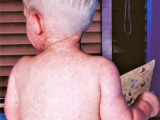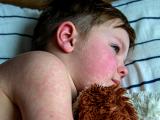Apr 21, 2009 (CIDRAP News) – Health officials in the Washington, DC, area today said they were working to identify people who may have been exposed to a patient with measles, as officials in other states, including Virginia, Iowa, and Pennsylvania, were responding to three other recent measles exposures.
The measles patient in Washington visited a handful of sites Maryland, Virginia, and the nation's capital on Apr 4 and 5, which prompted authorities in all of the jurisdictions to issue public heath alerts urging those who think they may have been exposed to call in to emergency numbers. The Washington Post reported yesterday that the man, who had not been vaccinated against measles, contracted the virus during a 3-week trip to India.
Virginia's health department announced in a press release today that it had confirmed its first measles case of the year, in a Prince William county resident with no known link to the Washington, DC, case. Virginia officials are in the process of notifying people who may have been exposed to the patient at various sites between Apr 10 and 15.
Meanwhile, the Iowa Department of Public Health (IDPH) on Apr 16 reported measles in a child from the northwestern part of the state. The department said that it and local officials were determining who may have been exposed to the disease and investigating the source of the child's infection. Health officials held a free measles vaccine clinic in Spencer, Iowa, on Apr 18 for those concerned about possible exposure to the virus, according to an Associated Press report.
One week earlier, the Pennsylvania Department of Health (PDH) reported that the source of a recent measles outbreak involving six patients in the southwestern part of the state was a traveler from India who arrived in the United States on Mar 7. In an earlier statement the PDH said the confirmed case-patients included three members of a Westmoreland County family—two children under age 5, who had not received the measles-mumps-rubella (MMR) vaccine, and their 33-year-old father, who had received only a single dose of the vaccine as a child.
Measles is a highly contagious viral disease that can infect as many as 90% of susceptible contacts, according to the US Centers for Disease Control and Prevention (CDC). Symptoms include a rash, high fever, cough, runny nose, and watery eyes. The virus spreads through coughing and sneezing, and patients can transmit the disease within 4 days before and after rash onset. Complications, ranging from diarrhea to encephalitis, occur in about 20% of patients and can be fatal.
The spate of recent measles cases raises concerns like those expressed last year, when measles cases climbed to 138, after averaging about 50 a year between 2004 and 2007, according to the April 17 issue of Morbidity and Mortality Weekly Report (MMWR). As of Apr 11, the CDC had already recorded 14 measles cases this year.
Rising measles cases herald a worrisome drop in overall US vaccination rates, the CDC said in an August 2008 MMWR update on the disease. "Measles is one of the first diseases to reappear when vaccination coverage rates fall," the agency said.
Through the end of July last year, the CDC had already recorded 131 measles cases, from 15 states and the District of Columbia. Only 17 (13%) cases were importations, coming from Europe, India, Israel, China, Pakistan, and the Philippines. However, 99 (76%) of the cases had epidemiologic or virologic links to importation. The source in 15 (11%) of the cases could not be determined.
The CDC said the number of measles cases reported through July 2008 was the highest since 1996. But the increase was not linked to more imported cases, but rather greater viral transmission after importation into the United States. The authors described a measles outbreak in Washington that had 19 linked cases and one in Illinois that had 30.
Such importation-associated cases were occurring largely among school-age children who are eligible for vaccination, but whose parents decline the vaccines for philosophical or religious reasons, the CDC said, citing a recent study that showed in increasing number of vaccine exemptions in school children. Also, the CDC added that many states exempt home-schooled children from vaccination requirements. Last year's measles outbreaks in Washington and Illinois both occurred primarily in home-schooled children.
Last year, the United Kingdom's Health Protection Agency declared that after a drop in vaccination rates, measles was endemic again, 14 years after the disease was considered eliminated.
The CDC predicted that measles importations would continue to cause outbreaks in US communities, especially ones that have large clusters of unvaccinated people.
Patricia Quinlisk, MD, MPH, medical director at IDPH, said in the press release that the measles cases serve as a reminder for parents to vaccinate their children. "All Iowans should check their child's immunization records, as well as their own to make sure their measles vaccinations are up-to-date," she said.
See also:
CDC. Notifiable diseases/deaths in selected cities weekly information. MMWR 2008 Apr 17;58(14);376-87 [Full text]
CDC. Update: measles, United States, January-July, 2008. MMWR 2008 Aug 22;57(33):893-96 [Full text]
April 21 Virginia Department of Health press release



















